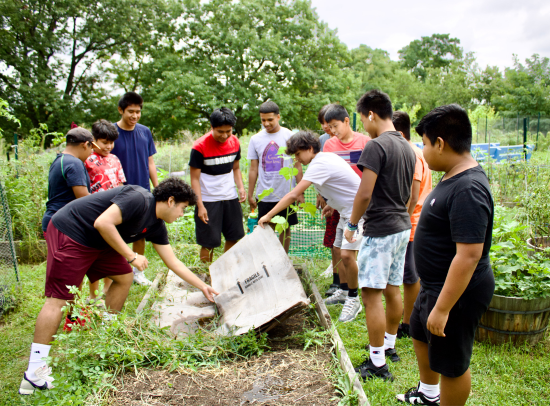In Pittsburgh, a city steeped in the history of America’s industrial boom and change, a new collective of voices is being heard. The sound is different, reflecting a tapestry of fresh cultural experiences, and its source is Casa San Jose. There, Latino families and individuals are coming together and creating an opportunity to infuse Pittsburg with a new vitality for the future.
Established in 2013 by the Sisters of St. Joseph of Baden, Casa San Jose was born out of a deep-seated commitment to uplift and empower the region’s burgeoning Latino population. The richly faceted social services agency embodies the resilience and empowerment that define the organization’s mission.
Monica Ruiz, Executive Director of Casa San Jose in Pittsburgh, Pennsylvania, readily acknowledges the challenges and growth of the Latino community. She states, “I think that for us here in Pittsburgh, PA, Latinos are less than 2% of the population, but we have grown more than 80% in the last ten years. Before, Latinos came for work and then left to return to their homes, returning seasonally. But then, they began to settle here and stayed to raise their families.”
As the city witnessed an influx of newcomers, Casa San Jose emerged as a lifeline, filling in the gaps for services that the community desperately needed but were unavailable. Monica’s vision extended beyond immediate aid; she aimed to create bridges within institutions and processes that have seen little change in decades.
Monica laments, recounting the countless instances where community members were stranded because of a lack of linguistic support in crucial institutions. “Language access remains a significant barrier,” Ruiz states. “Language access must be our greatest barrier at present. You go into a city or county office, and they have nothing in Spanish for residents. Even healthcare services lack language and cultural accessibility. For example, we only have two Spanish-speaking pediatricians,” she says.
The organization’s staff reflects the community they serve. Ruiz notes, “We have a staff of 27, and out of these individuals, maybe six or seven were born here in the United States. Everyone else is from somewhere else or has received services from us. Their lived experience is invaluable as they now help others. We have a great mix of people,” Monica beams, highlighting their shared experiences as immigrants and their dedication to the cause.
“Casa San Jose fills gaps in services for the community,” Ruiz emphasizes. “However, we want people to acquire the skills and knowledge to learn how to navigate the services themselves in this city. This is a very complex process, but we’re building resiliency within folks as they experience success,” she adds.
Casa San Jose is a resource hub for Latino immigrants seeking assistance and guidance from weekly clinics and food pantries to Know Your Rights sessions and summer camps. Its comprehensive programs encompass social services, emergency aid, community advocacy, English language classes, mental health support, housing assistance, and specialized programs for children with autism.
As importantly, Casa San Jose champions amplifying inclusion at every level within the larger community, ensuring that the voices of those they serve are heard and elevated. “Representation is essential,” emphasizes Monica. Particularly important is pushing for inclusivity in decision-making processes in programs and services that impact the Latino population. Ruiz explains, “Representation means having people with a voice and viewpoint authentic to the issue or need we are addressing in our city.“
One central area of focus of Casa San Jose is working with local youths through several of the organization’s programs: Jóvenes Con Propósito fosters a vibrant community of Latino youth, championing immigrant rights and igniting social change. With a firm belief in the current leadership of today’s youth, the program meets weekly during the academic year, nurturing empowerment and activism.
Puentes Hacia el Futuro, tailored for ages 6-14, cultivates cultural identity and leadership skills through trust-building activities, discussions, and educational pursuits, preparing youth for a dynamic future blending Latino and American cultures.
Campamento Sonrisa offers an enriching summer experience for youths aged 7-14, blending education, outdoor adventures, and sports. Participants enjoy nutritious meals throughout the structured camp, including breakfast, lunch, and snacks. The elementary session runs from June to July, while the middle school session spans from mid-July to August, providing an inclusive opportunity for all applicants at no cost.
Casa San Jose serves multi-generational families in tangible, practical ways every day. For its stakeholders, it is both about the here and now and the future of the Latino comunidad. “We are learning from other larger cities with decades of experience working within significantly bigger Latino populations,” says Ruiz. “At the same time, I hope that we can offer smaller communities near and around us an example of how to build resilience and help our people not just survive but thrive for years to come,” she adds.

